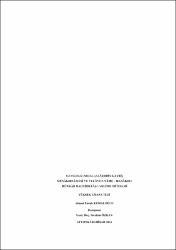Kaygusuz Abdal (Alâeddin Gaybî) Menâkıbnâmesi Ve Velâyet-Nâme - Manâkıb-I Hünkâr Hacı Bektâş-I Veli'de Mitoloji
Özet
İnsanlığın genel anlamda evreni anlama ve anlamlandırma bağlamında ortaya koyduğu bilgi ve uygulamalar olan mitin özünü iman unsuru oluşturur. Özünde iman unsuru olan mitin kutsal bir mahiyet taşıması, onun Tanrısal/dini bir kaynağa dayanmasındandır. Mitin özünde bulunan bu kutsallık, miti döngüsel bir zamana bağlı kılar. Böylece içinde bilindik zaman kavramı bulunmayan mit, ilerleme ve zamanın sembolü tarihin karşısında yer alır. Ancak insanların ilk bilgisi olan mit, her ne kadar tarihin karşısında olsa da, tarih sahnesinde, mitik "an"da üretilen ilk bilgiler dönüşüme uğrayarak ait olduğu kültürlerin anlatı dünyasında varlığını sürdürür. Türk kültürü anlatı dünyasının dini anlamda önemli bir kolu olan menkıbeler de mitik "an"ın bu ürünlerini içinde taşır. Özellikle mitin Tanrısal/dini özü, bu dönüşümü dini mahiyeti olan anlatı dünyası içinde varlığını devam ettirmesini kolaylaştırmıştır.
Bu çalışmada Kaygusuz Abdal Menâkıbnâmesi ile Vilâyetnâme'de geçen mitik unsurlar metin merkezli olarak incelenmiştir. Bu unsurlar incelenirken mitik unsurların oluştuğu sözlü kültür ortamına, sözlü kültürün halk muhayyilesine olan etkisine, bu etkinin yaratıma olan yansımasına özellikle değinilmiştir.
Çalışma beş bölümden oluşmaktadır. Birinci bölümde menkıbe, menâkıbnâme ve Türk edebiyatındaki menâkıbnâme geleneği üzerinde durulmuştur. İkinci bölümde Kaygusuz Abdal Menâkıbnâmesi ile Vilâyetnâme'nin konusu hakkında bilgi verilmiş, üçüncü bölümde Kaygusuz Abdal ve Hacı Bektâş'ın tarihsel kişilikleri üzerinde durulmuştur. Dördüncü bölümde mit/mitoloji kavramı çeşitli tanımlar çevresinde incelenmiş, beşinci bölümde ise incelediğimiz kaynaklarda yer alan mitik unsurlar çeşitli açıklama ve örnekler eşliğinde sunulmuştur. Essence of the myth which is knowledge and practices presented by humanity in the context of understanding and sense-making the universe in general terms is constituted by faith element. That myth, in which there is the faith element in its essense, bears a sacred nature is due to the fact that it is based on a divine/religious source. This sacredness present at the essence of myth makes the myth a cyclical time-dependent. Thus, the myth in which there is not the customary time concept takes a place against progress and history which is symbol of the time. But, although the myth that is people’s first knowledge is against history, the first knowledge which had been produced at mythic ‘‘moment’’ still continue their existence, by undergoing transformation, in narrative world of cultures to which they belong. Also sagas that are an important section of narrative world of Turkish culture in a religious sense contain within themselves these products of the mythical ‘‘moment’’. Particularly, divine/religious essense of the myth made it easier for this transformation to continue its existance within the narrative world which has a religious nature.
In this study, we examined text-centeredly mythic elements which are mentioned in Menâkibnâme (Sufi hagiography) of Kaygusuz Abdal and Vilâyetnâme (Saintly Exploits of Haji Bektash Veli). In examining these elements, we addressed oral culture medium in which mythic elements have been constituted, the impact of oral culture on public (folk) imagination, and reflection of this impact on the creation, in particular.
The study consists of five chapters. In the first chapter, we dwelled upon saga, menâkibnâme (Sufi hagiography) and menâkibnâme tradition in Turkish literature. In the second chapter, we informed about the subject of Menâkibnâme of Kaygusuz Abdal and of Vilâyetnâme; and in the third chapter, we deliberated on historical personalities of Kaygusuz Abdal and Haji Bektash. In the fourth chapter, we examined myth/mythology concept within the scope of various definitions; and in the fifth chapter, we presented mythic elements which take place in references which we examined, in company with various explanations and examples.
Bağlantı
http://hdl.handle.net/11630/4358Koleksiyonlar
- Yüksek Lisans Tezleri [1691]



















